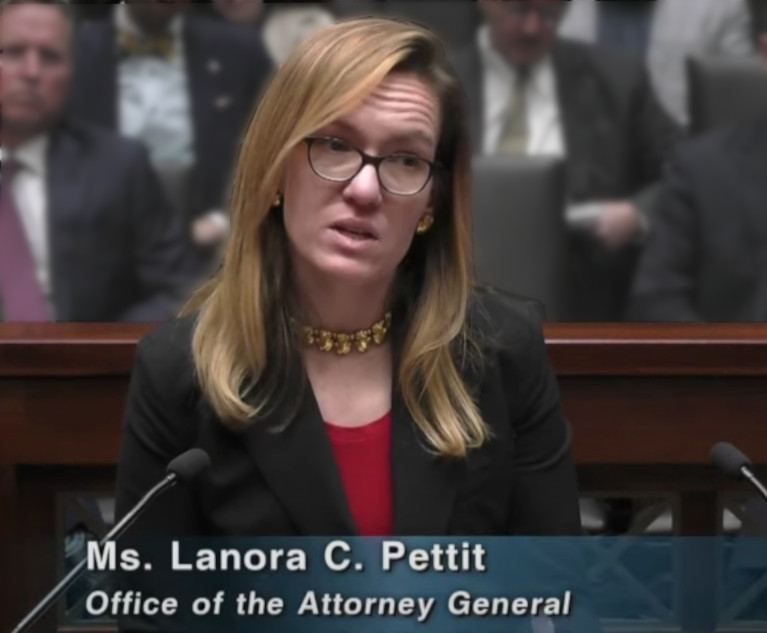Texas Judge Stops Fighting Judicial Ethics Case to Focus on Major Trial He's Adjudicating
"I could not pursue and devote attention to the [special court of review] appeal without neglecting my judicial responsibilities, something I was unwilling to do," said Judge Jonathan Bailey.
September 13, 2019 at 04:29 PM
3 minute read
 431st District Judge Jonathan Bailey of Denton County
431st District Judge Jonathan Bailey of Denton County
A special court of review has reinstated a public admonition against 431st District Judge Jonathan Bailey after he nonsuited his appeal of the sanction, which condemned him for violating a father's rights in a parental-termination case.
Bailey indicated he would instead focus on a death-penalty case he's adjudicating, instead of fighting the ethics charge against him.
"Having considered the significant judicial resources that will be expended by this special court of review, I no longer wish to pursue this matter, and hereby give notice of nonsuit with respect to my request for a trial de novo," the judge wrote.
His notice of nonsuit, which asked the court to dismiss his appeal with prejudice, suggests the judge won't continue to challenge his public admonition.
Bailey wrote in an email that the trial in his appeal was scheduled for Sept. 16, when he'll be presiding over an ongoing capital murder trial in which the defendant faces the death penalty.
"I could not pursue and devote attention to the [special court of review] appeal without neglecting my judicial responsibilities, something I was unwilling to do," Bailey said.
The Texas Commission on Judicial Conduct filed a charging document in Bailey's appeal that recounted the same allegations of judicial misconduct contained in the commission's July 16 public admonition against Bailey.
That admonition condemned Bailey's conduct in a parental rights termination case between a Texas agency and a father. The commission found Bailey violated judicial ethics rules, which require judges to recuse themselves when it's appropriate, to be patient, dignified and courteous to those who appear before them in court, and to perform their duties without bias or prejudice.
"The judge failed to treat [the] father with patience, dignity and courtesy by characterizing his trial testimony as 'ridiculous' and 'crap,' and threatening him with prosecution for perjury," the public admonition said.
It recounted findings of an appellate court that overturned Bailey's ruling. The appellate court found Bailey coerced the Texas Department of Family and Protective Services into seeking termination of the father's parental rights, fast-tracked the trial, improperly considered evidence in matters related to other children in the family, failed to appoint a lawyer for the father in a timely manner, refused both sides a continuance, acted as an advocate by questioning the father in the trial, and more.
"I continue to disagree with several of the [State Commission on Judicial Conduct's] allegations, and believe that I could have successfully demonstrated that those allegations were baseless," Bailey wrote in his notice. "However, I came to the conclusion that the appeal would demand considerable judicial resources—from myself and the justices assigned to the [special court of review]—that were better devoted to our primary judicial responsibilities."
Eric Vinson, executive director of the judicial commission, didn't respond to an email seeking comment before deadline.
Related stories:
Public Admonition for Texas Judge Who Called Litigant's Testimony 'Crap'
In Rare Move, Texas Judge Appeals Judicial Misconduct Sanction
Read the commission's charging document:
This content has been archived. It is available through our partners, LexisNexis® and Bloomberg Law.
To view this content, please continue to their sites.
Not a Lexis Subscriber?
Subscribe Now
Not a Bloomberg Law Subscriber?
Subscribe Now
NOT FOR REPRINT
© 2025 ALM Global, LLC, All Rights Reserved. Request academic re-use from www.copyright.com. All other uses, submit a request to [email protected]. For more information visit Asset & Logo Licensing.
You Might Like
View All


Trending Stories
- 1A&O Shearman To Lose Another Five Lawyers to EY
- 2Pearl Cohen Enters San Francisco Market Via Combination With IP Boutique
- 3'Incredibly Complicated'? Antitrust Litigators Identify Pros and Cons of Proposed One Agency Act
- 4'A Warning Shot to Board Rooms': DOJ Decision to Fight $14B Tech Merger May Be Bad Omen for Industry
- 5Securities Action Targeting Polestar Alleges Mistakes in SEC Filings
Who Got The Work
J. Brugh Lower of Gibbons has entered an appearance for industrial equipment supplier Devco Corporation in a pending trademark infringement lawsuit. The suit, accusing the defendant of selling knock-off Graco products, was filed Dec. 18 in New Jersey District Court by Rivkin Radler on behalf of Graco Inc. and Graco Minnesota. The case, assigned to U.S. District Judge Zahid N. Quraishi, is 3:24-cv-11294, Graco Inc. et al v. Devco Corporation.
Who Got The Work
Rebecca Maller-Stein and Kent A. Yalowitz of Arnold & Porter Kaye Scholer have entered their appearances for Hanaco Venture Capital and its executives, Lior Prosor and David Frankel, in a pending securities lawsuit. The action, filed on Dec. 24 in New York Southern District Court by Zell, Aron & Co. on behalf of Goldeneye Advisors, accuses the defendants of negligently and fraudulently managing the plaintiff's $1 million investment. The case, assigned to U.S. District Judge Vernon S. Broderick, is 1:24-cv-09918, Goldeneye Advisors, LLC v. Hanaco Venture Capital, Ltd. et al.
Who Got The Work
Attorneys from A&O Shearman has stepped in as defense counsel for Toronto-Dominion Bank and other defendants in a pending securities class action. The suit, filed Dec. 11 in New York Southern District Court by Bleichmar Fonti & Auld, accuses the defendants of concealing the bank's 'pervasive' deficiencies in regards to its compliance with the Bank Secrecy Act and the quality of its anti-money laundering controls. The case, assigned to U.S. District Judge Arun Subramanian, is 1:24-cv-09445, Gonzalez v. The Toronto-Dominion Bank et al.
Who Got The Work
Crown Castle International, a Pennsylvania company providing shared communications infrastructure, has turned to Luke D. Wolf of Gordon Rees Scully Mansukhani to fend off a pending breach-of-contract lawsuit. The court action, filed Nov. 25 in Michigan Eastern District Court by Hooper Hathaway PC on behalf of The Town Residences LLC, accuses Crown Castle of failing to transfer approximately $30,000 in utility payments from T-Mobile in breach of a roof-top lease and assignment agreement. The case, assigned to U.S. District Judge Susan K. Declercq, is 2:24-cv-13131, The Town Residences LLC v. T-Mobile US, Inc. et al.
Who Got The Work
Wilfred P. Coronato and Daniel M. Schwartz of McCarter & English have stepped in as defense counsel to Electrolux Home Products Inc. in a pending product liability lawsuit. The court action, filed Nov. 26 in New York Eastern District Court by Poulos Lopiccolo PC and Nagel Rice LLP on behalf of David Stern, alleges that the defendant's refrigerators’ drawers and shelving repeatedly break and fall apart within months after purchase. The case, assigned to U.S. District Judge Joan M. Azrack, is 2:24-cv-08204, Stern v. Electrolux Home Products, Inc.
Featured Firms
Law Offices of Gary Martin Hays & Associates, P.C.
(470) 294-1674
Law Offices of Mark E. Salomone
(857) 444-6468
Smith & Hassler
(713) 739-1250







